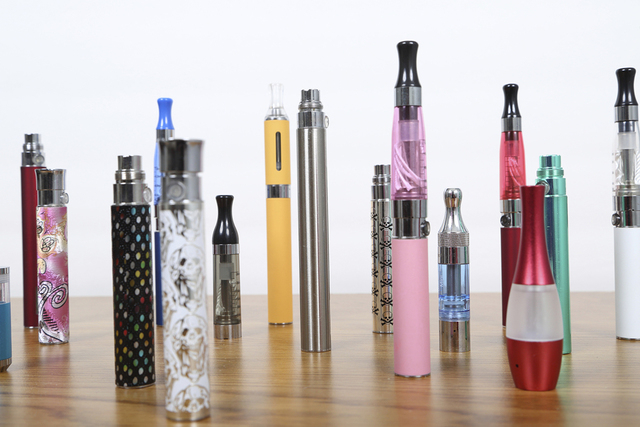Southern Nevada Health District supports taxing e-cigarettes like tobacco products

Vaping is hazardous and should be treated like smoking cigarettes, the Southern Nevada Health District said Wednesday in backing a proposal to tax electronic cigarettes and their components as if they were tobacco.
Lawmakers, medical personnel and parents should limit the availability of e-cigarettes, a health district statement said. There should be age, marketing and flavor restrictions, and selling the devices should require a tobacco retail license. Minors should be restricted from buying them.
The health district also encouraged lawmakers to treat e-cigarettes like conventional tobacco cigarettes in the state’s Clean Indoor Air Act — aimed at protecting people from secondhand smoke in most public places and indoor places of employment.
“Electronic cigarettes have become a new trend among young people, with national companies using celebrities to advertise their products,” chief health officer Joe Iser said.
Ads produced in 2013 for blu e-Cigs, an electronic cigarette brand, featured TV personality Jenny McCarthy touting the stench-free devices that give users the “freedom to have a smoke when you want, where you want.”
A Pinterest board labeled “E-Cigarettes &Celebrities” features stars like Leonardo DiCaprio, Katy Perry and Johnny Depp puffing on vaporizers.
“If appropriate restrictions are not put into place now, the recent efforts of public health to limit smoking and to make the habit socially unacceptable will be reversed,” Iser said.
Legislators are debating a bill that would tax e-cigarettes and liquid nicotine like tobacco products. Regular cigarettes, cigars and chew are taxed at a rate of 30 percent of the wholesale price in Nevada.
Tom Harmon, who owns the Sin City Vapor chain, with four locations in the valley, said just because e-cigarettes and regular tobacco cigarettes have one similar ingredient, they’re not the same.
“Calling liquid nicotine a tobacco product is like calling Coca Cola coffee just because it has caffeine in it,” Harmon argued.
As for age restrictions, everyone agrees that selling liquid nicotine products to minors should be prohibited, said Bryan Bedera, a lobbyist for the Nevada Vaping Association.
He said the association, in conjunction with Sen. Patricia Farley, R-Las Vegas, has already submitted legislation to make selling the products to minors illegal. Farley could not be reached for comment Wednesday.
Harmon said his business doesn’t sell e-cigarettes or liquid nicotine products to minors and that his store has prominent signage saying no one under 18 is allowed in without an adult.
“Our primary demographic is over 40 and wants to quit,” Harmon said.
Harmon and Bedera both said the health district’s suggestion that electronic cigarettes and other liquid nicotine products be included under the Clean Indoor Air Act is unfounded.
“In 2013, published studies indicated that e-cigarettes do not just emit ‘harmless water vapor,’” the health district wrote in the health advisory. “Secondhand e-cigarette aerosol contains nicotine, ultrafine particles and low levels of toxins that are known to cause cancer.”
Secondhand e-cigarette “vapor” — which the health district calls a mischaracterization of the devices’ output — contains a higher concentration of those toxins than regular tobacco cigarette smoke, the health district statement said.
The health district’s release only cites studies that support their agenda, Harmon said.
“They sure seem to be leaving out a lot of research, especially about how much less harmful vaping is than regular smoking.”
The battery-powered devices don’t have to meet standards for the ingredients used to make vapors, the health district said.
Studies continue to reveal that ingredients in electronic cigarettes include chemicals that are classified as carcinogens.
But Bedera said the health district is jumping to a conclusion.
“The problem is that the science just hasn’t come out yet,” Bedera said. “Let’s not put Nevada regulations ahead of the FDA’s science.”
The health district also urged consumers to be leery of e-cigarettes being marketed as cessation devices. Also called hookah pens or vapors, they have not been approved as effective tools to quit smoking.
Bedera said shop owners have said “anecdotally” that customers have found success in switching from traditional tobacco products to e-cigarettes and liquid nicotine, but that no real marketing has been done to convince consumers to use these products for that purpose.
Harmon said 60 percent to 70 percent of his customers use e-cigarettes to wean themselves off of nicotine. But his business is careful to call personal vaporizers “the perfect alternative” to regular cigarettes and encourages smokers to “switch” to vaping, rather than use the devices as a tool to quit smoking.
“If people are vaping, they should be congratulated because, for that moment at least, they’re not smoking a cigarette,” Harmon said.
Contact Kimber Laux at klaux@reviewjournal.com or 702-383-0381. Find her on Twitter: @lauxkimber.